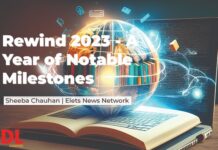

Dr Pascal Chazot,
Member of Parliament in France for French Overseas; President,
National Commission of Employment and Training, France
Diversity in the classroom is the best possible asset
In 1988, I had spent a day in Paris with a very famous director Steven Spielberg. He wanted to persue a course in cinema and prepare for his Bachelors. But the University found that he was not qualified enough for that course. And now after 25 years, the same university has awarded him an honorary degree in cinematography. This clearly shows how the education system runs. So basically the problem is total inadequacy between the real world and the education system. We have to change the system, to make it good enough for the needs of the real world. Because we are basically looking at human beings, and through education we are contributing to society, to a human world.
Components of change
When we say that we need to change, what are the main components of this change? Basically when you talk about education, often we look at the big picture, the numbers and the figures are important especially in India, where we have hundreds of millions of students. However, instead of looking at large masses, we have to distil education down to one human being, one child who has grown around the years. To understand education, we should really remember this child, and do everything possible for this child. As far as I am concerned, I consider that education is what is happening in the classroom, the methodology, the relationship between the teacher and the child. This is very important. And it goes through from preprimary level to the high school level. I think that is the most important factor because basically we are looking at the development of human being.
Textbooks, memorising, and content centric education are totally obsolete in today’s context. Content is available in any of the instruments like iPad, tablets of other make or mobile phone. You have all the contents that you need for your work. I don’t think you need to memorise anything. There is some other knowledge, which is much more important. There is knowledge that helps us develop the skill, the one that allows us to grow, to succeed in life and basically be happy in life. So that is why when we look at necessary change in education, we look at the change in methodology, the change in the pedagogy, on what is happening inside the classroom.
Learning can be easy
I have spent lots of time trying to teach my cat to speak French, it never spoke French. But to my daughter I never taught anything, but she learnt Hindi, because we are in India, she learnt Gujarati, she also learnt French, because I talk to her in French, she learnt English, because we are communicating in English. So we need education that is exponential, we need education that is useful.
The system has to change, we need to find solution. The immensity of the problem needs immensity of solution. In order to progress, we need to have contradiction, debate, different ideas and that is why we need diversity. Diversity in the classroom is the biggest possible asset in education. It was a crazy idea back in 1998; today in 2012, it has become a national reality. Right to Education has been voted by both the houses of the Indian Parliament and it is progressing slowly because there is lot of resistance, but the idea is going on. And I think that was a very important step ahead.
Creating lot of networks, collaboration is very important. In my work in the National Commission of Employment and Training, travelling is extensive. We have to also look at this possibility of exchange between different countries, different communities, different paths, accepting the different systems of education, giving value to them. I think sharing, collaboration and putting networks into place are the key to holistic development.






















